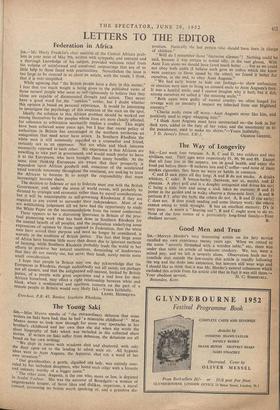LETTERS TO THE EDITOR
Federation in Africa
SIR,—Mr. Harry Franklin's clear analysis of the Central African prob- lem in your issue of May 9th, written with sympathy and restraint and a thorough knowledge of his subject, provided welcome relief from the volume of uninformed and emotional outpourings that are of so little help to those faced with practicalities. Nevertheless the issue is too large to be covered in so short an article, with the result, I think, that it is over-simplified.
While agreeing that " the British people have a duty in this matter," I fear that too much weight is being given to the published views of those carnesi people who seem so self-righteously to believe that they alone are capable of disinterested thought and action. They never have a good word for-the " ruthless " settler, but I doubt whether this opinion is based on personal experience. It would be interesting to investigate the psychology of this suspicion of the man on the spot.
Ideally the solution to this African problem should be worked out among themselves by the peoples whose lives are most closely affected, for reference to arbitration necessarily implies a conflict. This might have been achieved some years ago, but I fear that recent policy of authorities in Britain has encouraged in the northern territories-an antagonism that need never have arisen. In Southern Rhodesia the white man is still commonly regarded as a counsellor and friend, certainly not as an oppressor. Nor are white and black interests necessarily opposed, to each other. My experience is that Africans are unwilling to take part in government, and would much prefer to leave it to the Europeans, who have brought them many benefits. At the same time thinking Europeans are aware that their prosperity is dependent upon African goodwill and, conscious of the accelerated trend towards autonomy throughout the continent, are seeking to train the Africans to become fit to accept the responsibility that must increasingly become theirs.
The decision to federate or not to federate must rest with the British Government, and, under the stress of world events, will probably be dictated by strategic and economic rather than by moral considerations, but it will be unacceptable to self-governing Rhodesians if they are required to any extent to surrender their independence. Most of us are withholding judgement till we have had the opportunity to study the White Paper on the recommendations from the recent conference. There appears to be a distressing ignorance in Britain of the prac- tical pioneering work that has been done in Southern Rhodesia for the mutual benefit of all 'peoples, and the implication underlying some expressions of opinion by those opposed to Federation, that the white men have served their purpose and need no longer be considered, is scarcely in the tradition of British justice. The fact that large areas of Africa have become little more than desert due to ignorant methods of farming, while Southern Rhodesia probably leads the world in her efforts to preserve her natural resources, demanding of landowners that they do not merely use, but serve, their lands, surely merits some small consideration.
I hope that people -in Britain may one day acknowledge that the Europeans in Rhodesia, though undoubtedly not all saints, are,perhaps not all sinners, and that the enlightened self-interest, backed by British justice, of a people with great experience and a real love for their African homeland, may effect a right relationship between white and black, when a sentimental and apathetic concern on the part of a remote people in Britain would very likely fail.—Yours faithfully, LIONEL HENRIQUES. Erewhon, P.B. 41, Banket, Southern Rhodesia.


















































 Previous page
Previous page